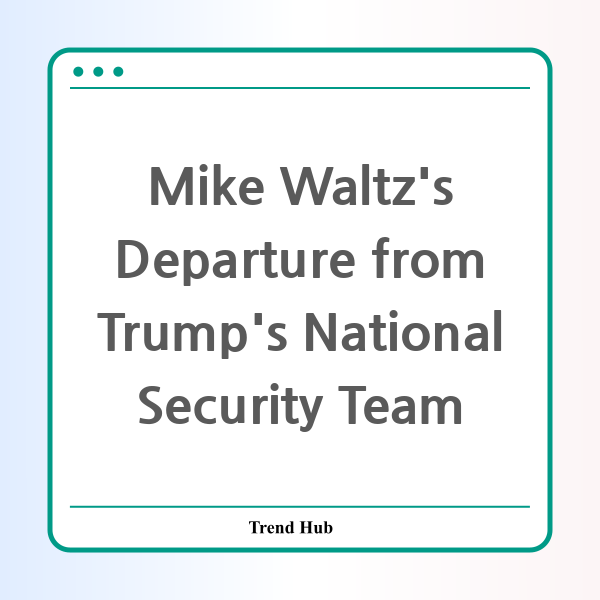* This website participates in the Amazon Affiliate Program and earns from qualifying purchases.

In a significant shift within the Trump administration, national security adviser Mike Waltz and his deputy, Alex Wong, are set to depart their positions, marking a pivotal moment in the National Security Council (NSC). The recent developments come as both Waltz and Wong have reportedly lost the confidence of President Trump, particularly after a series of missteps and controversies that unfolded during their tenure.
Waltz's departure, which is expected to take effect imminently, follows an incident in March that drew sharp scrutiny. He mistakenly included a reporter in a group chat regarding military operations targeting Houthi forces in Yemen, creating a stir that ultimately undermined his credibility within the administration. While President Trump initially expressed support for Waltz, referring to him as a "good man who learned a lesson," the incident set the stage for Waltz's diminishing influence in the West Wing.
Sources indicate that after serving nearly 100 days in this capacity, Waltz's time leading the NSC was effectively decided during discussions earlier this week. His deputy, Wong, who played a significant role in facilitating diplomatic relationships, particularly with North Korea, will also be stepping down in what is being framed as part of a broader reorganization of the NSC. Trump’s chief of staff has been engaged in conversations with NSC staff to discuss the upcoming changes.
The shifting dynamics within the administration seem to reflect a larger strategy on President Trump’s part to realign his national security team as he approaches crucial foreign policy engagements. With alternative candidates for the position of national security adviser being considered, special envoy Steve Witkoff has emerged as a frontrunner. Witkoff’s experience leading discussions with key international players such as Russia and Iran makes him a suitable candidate to step into the role.
Trump’s decision to reorganize the NSC may not come as a surprise given the ongoing challenges the administration faces in the global arena. The instances of public miscommunication and internal conflicts within Waltz’s team have highlighted the need for a more cohesive approach to national security matters. Furthermore, previous reports indicate that Waltz had been attempting to remain relevant within the administration, even attending Cabinet meetings and appearing on media outlets. However, his absence during presidential travel has raised eyebrows and speaks to his precarious standing.
The ramifications of Waltz and Wong's exits may lead to fresh leadership and strategic shifts that could better align with Trump's objectives moving forward. This transition comes amid broader efforts to navigate international relations, especially in the wake of heightened tensions with countries like North Korea and Iran. As the situation continues to develop, it remains clear that the NSC will be a focal point for upcoming foreign policy initiatives.
As we analyze these changes within the Trump administration, the emphasis on securing competent leadership in the NSC cannot be overstated. The administration's approach to national security will be instrumental in shaping the United States' stance on global issues, and those who step into these roles will undoubtedly play significant parts in steering the course of U.S. policy.
In conclusion, as Waltz and Wong prepare to bid farewell, the Trump administration gears up for a new chapter in national security leadership. Observers will be closely monitoring how these changes will impact U.S. foreign relations and national security strategy in the coming months.
* This website participates in the Amazon Affiliate Program and earns from qualifying purchases.